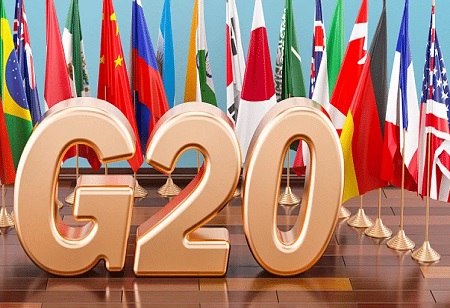G20 Independent Expert Group will release its multilateral banking road plan
By Consultants Review Team
 The World Bank and the Asia Development Bank will be among the organizations that will undergo change under the strategy and detailed plan released by the G20 Independent Expert Group on Strengthening Multilateral Development Banks (MDBs) next month. In addition to increasing their financial capability, the ideas include ones that would allow MDBs to access private financing, according to the group's co-chair NK Singh. "We are going into greater granularity on how you really achieve this private capital what incentive, risk mitigation can you do," Singh, who is also chairman of the Fifteenth Finance Commission. The report would dwell on an efficient operating model for the MDBs that would be appropriate to meet emergent challenges and develop the ability to harness innovative capital hybrid and blended and coordination among them.
The World Bank and the Asia Development Bank will be among the organizations that will undergo change under the strategy and detailed plan released by the G20 Independent Expert Group on Strengthening Multilateral Development Banks (MDBs) next month. In addition to increasing their financial capability, the ideas include ones that would allow MDBs to access private financing, according to the group's co-chair NK Singh. "We are going into greater granularity on how you really achieve this private capital what incentive, risk mitigation can you do," Singh, who is also chairman of the Fifteenth Finance Commission. The report would dwell on an efficient operating model for the MDBs that would be appropriate to meet emergent challenges and develop the ability to harness innovative capital hybrid and blended and coordination among them.
It will also take into account the symmetry and cohesiveness of goals that might "come within the MDB family to improve the overall capability and reach," Singh added. At the G20 finance ministers and central bank governors meeting in July, the committee, co-chaired by Singh and former US Treasury secretary Larry Summers, presented the first volume of its report. The G20 Leaders' Declaration from New Delhi included the suggestions. The report put the private capital requirement of MDBs at $500 billion. Singh said the roadmap specified in the second part of the report will also detail the sequencing of the reforms. " The low-hanging fruit, in my view, is clearly the optimization of the balance sheet," Singh said, adding that other issues, including getting more out of the existing equity itself, recalibrating risk appetite, and creative use of guarantees, would be in focus.
MDBs' record in being able to get only 0.6 cents to $1 in terms of private capital needs to be bumped up, he said, adding this would require significant changes in the operating model of the MDBs. "First of all, it requires a definite change in nature, skills, and manpower," Singh said, adding that the existing bureaucracy of the MDBs does not have the ability to be able to go out and seek private capital very imaginatively. Their incentive structure and their targets do not factor in the need to aggressively secure private capital participation, he said, adding that it also requires training on how to structure and use guarantees. It requires a hybrid model and better country platforms, he said.
"A very important feature is the creation of robust country platforms, and the country platform makes it obligatory for one multinational development bank to share with another," Singh said. He emphasized that transformative restructuring of the MDBs should be a priority. He pointed out that the first volume of the report suggested the use of an additional mechanism for purpose, a Global Challenges Fund, which is supposed to be able to provide flexibility in harnessing multiple forms of capital and innovatively blending. The panel in the first volume of the report recommended that the MDBs adopt a triple mandate of eliminating extreme poverty, inclusive growth, and financing global public goods.




